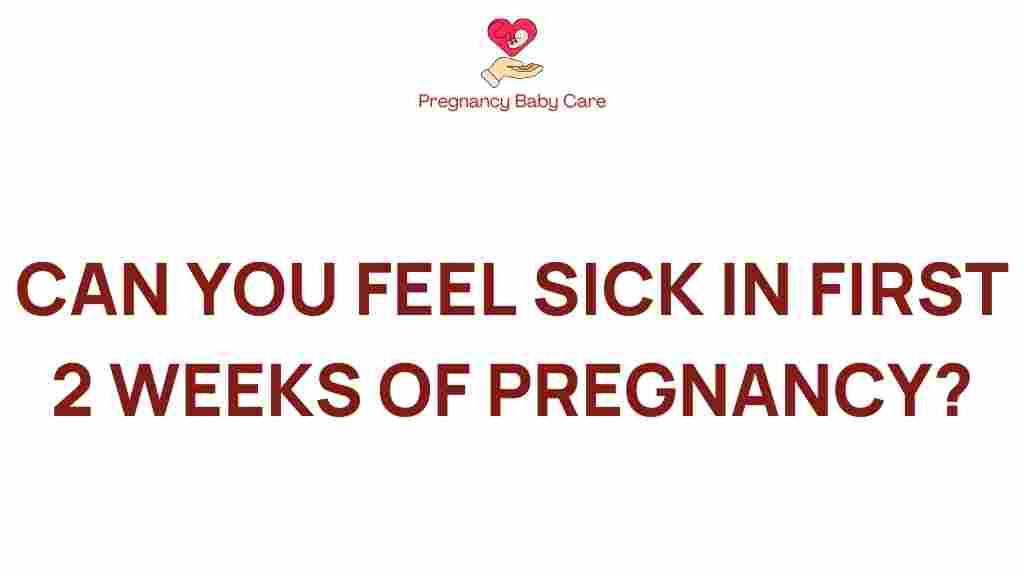Early Signs of Pregnancy: Can You Really Feel Sick Within Two Weeks?
When it comes to pregnancy, many women wonder what the early symptoms are and when they might begin to feel them. The question often arises: can you really feel sick within two weeks of conception? The answer is yes, and understanding the early pregnancy symptoms can help you navigate this exciting yet challenging time. In this article, we will explore the early signs of pregnancy, including morning sickness, hormonal changes, and other common symptoms that may occur during the first trimester.
Understanding Early Pregnancy Symptoms
Early pregnancy symptoms can vary significantly from woman to woman. Some may notice changes shortly after conception, while others may not experience symptoms until later in the first trimester. Here are some of the common early pregnancy symptoms to look out for:
- Nausea: Often referred to as morning sickness, nausea can occur at any time of the day and usually begins around the sixth week of pregnancy, but some women may start feeling it as early as two weeks after conception.
- Fatigue: Hormonal changes can lead to increased fatigue. Many women report feeling unusually tired as their body begins to adjust to the pregnancy.
- Breast Changes: Hormonal changes can cause breasts to become tender, swollen, or more sensitive.
- Frequent Urination: As the uterus expands, it can put pressure on the bladder, leading to more frequent trips to the bathroom.
- Food Aversions or Cravings: Changes in taste and smell can lead to sudden aversions to certain foods or cravings for others.
- Missed Period: One of the most definitive early signs of pregnancy is a missed menstrual period.
The Role of Hormonal Changes
Hormonal changes are a significant factor in early pregnancy symptoms. After conception, the body begins to produce hormones such as human chorionic gonadotropin (hCG), progesterone, and estrogen, which play crucial roles in maintaining the pregnancy. These hormonal shifts can lead to various physical and emotional changes, including:
- Mood Swings: Fluctuating hormone levels can affect your mood, leading to irritability or emotional highs and lows.
- Increased Sensitivity: Many women report heightened sensitivity to smells and tastes, which can contribute to nausea.
- Changes in Sleep Patterns: Hormonal changes may affect your sleep, resulting in insomnia or excessive sleepiness.
What to Expect in the First Trimester
The first trimester lasts from week one to week twelve of pregnancy. During this time, your body undergoes numerous changes as it adjusts to the pregnancy. Here is a brief overview of what to expect:
- Weeks 1-4: Many women may not yet realize they are pregnant. Symptoms such as fatigue, mild cramping, and breast tenderness may start to appear.
- Weeks 5-8: Morning sickness often begins around this time, along with increased fatigue and frequent urination. Emotional changes may also become more pronounced.
- Weeks 9-12: Symptoms may continue, but many women find that nausea decreases around the end of the first trimester. By week twelve, many women feel a surge of energy as their bodies adapt to the hormonal changes.
Health Tips for Managing Early Pregnancy Symptoms
Managing early pregnancy symptoms can help you feel more comfortable during this transitional period. Here are some health tips to consider:
- Stay Hydrated: Drink plenty of fluids, especially if you are experiencing nausea or vomiting.
- Eat Small, Frequent Meals: Rather than three large meals, try eating smaller meals throughout the day to help manage nausea.
- Rest When Needed: Listen to your body and take breaks when you feel fatigued.
- Avoid Triggers: If certain smells or foods make you feel sick, try to avoid them.
- Consult Your Doctor: If you have severe nausea or any concerns, it’s important to speak with your healthcare provider.
Common Questions About Early Pregnancy Symptoms
Can I Take a Pregnancy Test Early?
Home pregnancy tests can generally detect pregnancy about a week after a missed period. However, some sensitive tests may provide accurate results a few days earlier. It’s best to follow the instructions on the test for the most reliable results.
Are All Women Affected by Morning Sickness?
No, not all women experience morning sickness. While it is common, some women may not feel nauseous at all during their pregnancy.
How Long Does Morning Sickness Last?
Morning sickness typically begins around the sixth week and can last until the end of the first trimester, although some women may experience it longer.
Internal and External Resources for Further Reading
For more comprehensive information on pregnancy symptoms and health tips, you can visit this link. Additionally, the American Pregnancy Association provides valuable resources on various stages of pregnancy, including the first trimester.
Troubleshooting Common Early Pregnancy Concerns
If you’re experiencing overwhelming symptoms during early pregnancy, consider these troubleshooting tips:
- For Nausea: Ginger tea, crackers, and peppermint can help settle your stomach.
- For Fatigue: Prioritize rest, and try to take short naps when needed.
- For Breast Tenderness: Wearing a supportive bra can help alleviate discomfort.
Conclusion
In conclusion, early pregnancy symptoms can start as soon as two weeks after conception, with nausea and fatigue being among the most common. Understanding these symptoms and the hormonal changes that accompany pregnancy can help you prepare for the first trimester. Remember to prioritize your health and well-being, seek support when needed, and consult your healthcare provider for personalized advice. As you embark on this journey, being informed can make the experience more manageable and enjoyable.
This article is in the category Pregnancy and created by PregnancyBabyCare Team
